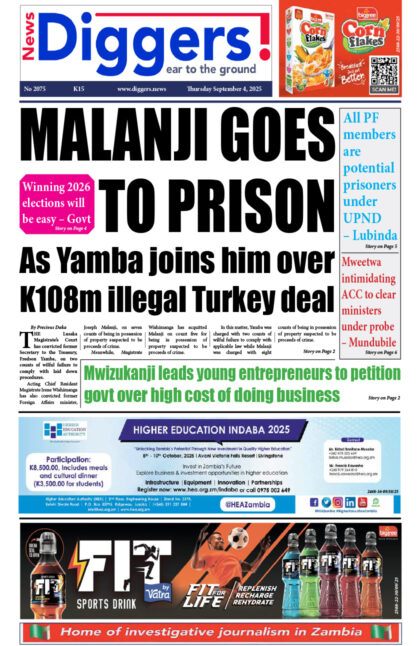HUMAN Rights Commission (HRC) spokesperson Mwelwa Muleya has wondered why opposition members of parliament are questioning its work and relevance when they remain major beneficiaries of its interventions.
In an interview, Muleya said that the Commission did not owe it to anyone to divulge information on their operations.
He was reacting to sharp concerns coming from opposition members of parliament questioning the Commission’s relevance, mainly due to their tendency of being reactive, rather than proactive to human rights abuses.
“We noted that that concern was coming from members of parliament from the opposition. Now, the Human Rights Commission, in a number of cases, the most victims of, for instance, arbitrary and over-detention are members of the opposition parties. And the Commission has been intervening in a number of cases where some party cadres have been over-detained, sometimes without any charge against the provision of the law, and the Commission has been coming to their aid. We have been intervening in those cases to ensure that they are either granted police bond or they are taken to court. So, sometimes you find leaders, who are talking like that are not even aware of what the Commission is doing in terms of helping their members because it’s not in our work to start even informing leaders that that’s what we have done, which is to assist the victims as victims and not as members of a given political party,” Muleya said.
“So, you find that even as late as today [Tuesday], we had one of the political party leaders calling us, saying ‘you are not doing anything, our member has been in detention for a long time,’ when they don’t even know what the Commission has been doing, interacting with that victim. They didn’t even know the status of that victim and why that victim or person, who was detained was in that state; they don’t realise that that is the intervention by the Human Rights Commission, but it’s because we don’t publicise that, but the victims, themselves, know that the Human Rights Commission visits them in the detention facilities. If it’s the correctional facilities, we visit them, we engage relevant authorities, the police, the National Prosecution Authority (NPA), the Judiciary. But we cannot at every point be announcing that, ‘today, we are going to see the NPA; today, we are meeting the Chief Justice…’ that’s not how we operate. So, the fact that people don’t know about what is happening should not entail that we don’t do that.”
He stressed that opposition members of parliament’s criticism may have been out of ignorance on the Commission’s operations.
“I think it’s lack of information, maybe some cases of some people saying that or it’s something, which is just indoctrinated in them where they always think that’s how the Commission works, they become oblivious of the tangible work, which the Commission has been doing. On a daily basis, we deal with cases of people in detention facilities, who are being released through our interventions. On a daily basis, thousands of people around the country, who are arbitrarily detained are receiving their right to liberty as a result of the intervention of the Human Rights Commission. A number of extra-judicial killings, which have taken place, you can name: Vespers, Flight Sergeant Chonga, just as an example; Frank Mugala and many other cases of extra-judicial killings, which the Commission has thoroughly investigated and ensured that the family of the deceased have received compensation, while the perpetrators are facing justice in the court of law in a number of cases. We have a number of cases where perpetrators have been convicted as a result of the investigation by the Human Rights Commission,” he said.
“So, it’s not always that the Human Rights Commission will be on a podium screaming about what we are doing, but the people who have benefitted from the HRC, some of them who have not even an opportunity to be on Facebook, will appreciate, they do appreciate that the Human Right’s Commission, always, we have an average of 1,000 cases of human rights violations every year, which we deal with and many ordinary Zambians will attest that a lot of their loved ones, friends, relatives have been assisted by the HRC, the only institution that provides legal services and human rights education, free of charge, because we are a public service institution, we are funded by the State, we provide those services as a matter of our constitutional mandate.”
And Muleya said when the Commission reacted to human rights abuses, it was just the beginning of investigations.
“So, it is not correct and it’s not true that the Human Rights Commission only reacts, and as a matter of fact, the reaction, when we condemn something, it does not end in just condemnation, it results into investigations and remedial measures taken in a number of cases and in some cases because of the confidentiality that we abide by depending on how the victims or perpetrators may want the case to be treated, others may want not to be in the public domain, they settle those cases behind the scenes away from the glare of publicity. So, that does not mean that the Human Rights Commission is not doing that. We are a State institution that doesn’t work like an NGO, but whatever happens, we are having publicity about because we depend on the consent of the victims and also other players; we take things into consideration of certain relationships we build, and our ultimate aim is to ensure that the victim receives justice,” said Muleya.
Recently, Chirundu UPND member of parliament Douglas Siakalima and his Kasempa counterpart Brenda Tambatamba urged the Commission to be proactive as opposed to being reactive to human rights abuses around the country.
























